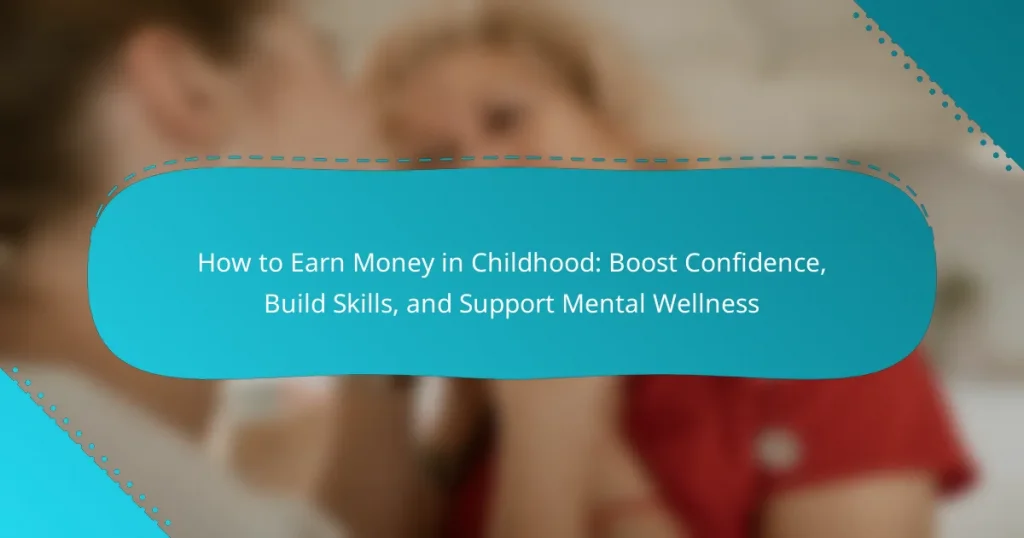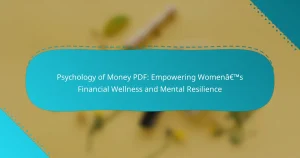Earning money in childhood boosts confidence, builds essential skills, and supports mental wellness. Children can engage in various activities like chores, tutoring, and crafting to develop responsibility and financial literacy. Unique opportunities for girls include freelance work and online platforms, fostering independence. Balancing work with self-care and maintaining supportive relationships enhances emotional regulation and resilience.
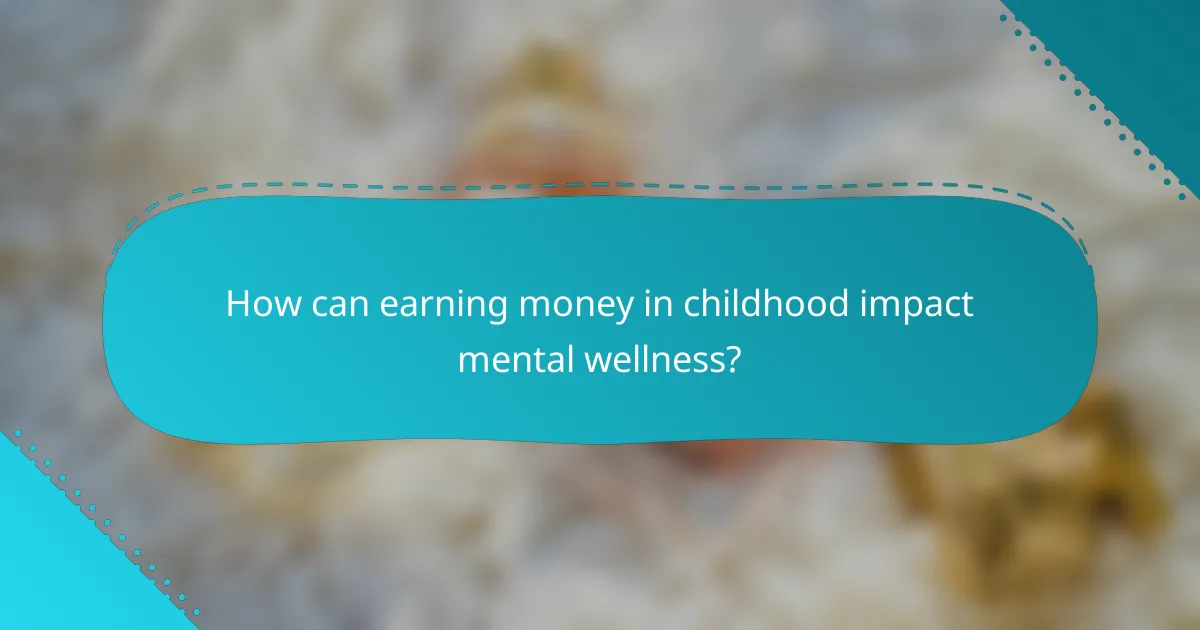
How can earning money in childhood impact mental wellness?
Earning money in childhood can significantly enhance mental wellness by boosting confidence and developing essential skills. Engaging in work fosters a sense of responsibility and accomplishment. Studies indicate that children who earn their own money report higher self-esteem and improved problem-solving abilities. These experiences contribute to better emotional regulation and resilience, essential components of mental health. Additionally, learning financial management at a young age prepares children for future challenges, promoting a sense of control over their lives.
What are the psychological benefits of financial independence for young girls?
Financial independence significantly enhances the psychological well-being of young girls. It fosters self-confidence, promotes decision-making skills, and encourages a sense of autonomy. As they learn to manage their finances, girls develop resilience and a positive self-image, which are crucial for mental wellness. Studies show that financial literacy correlates with increased self-esteem and reduced anxiety about the future. This empowerment through financial independence can lead to lifelong benefits in personal and professional spheres.
How does earning money enhance self-esteem in childhood?
Earning money in childhood significantly enhances self-esteem by fostering independence and responsibility. Engaging in money-making activities helps children develop essential skills such as time management and problem-solving. As they achieve financial goals, their confidence grows, reinforcing a positive self-image. Additionally, the experience of earning money can improve mental wellness by providing a sense of accomplishment and purpose.
What role does responsibility play in boosting confidence?
Responsibility significantly boosts confidence by fostering a sense of ownership and accountability. When children take on tasks, they develop skills and gain self-assurance. This process enhances mental wellness by creating a positive feedback loop, where successful completion of responsibilities leads to increased self-esteem. For example, managing chores or small projects cultivates independence and reinforces the belief in their abilities.
How can financial success lead to a sense of accomplishment?
Financial success fosters a sense of accomplishment by boosting self-esteem and reinforcing personal capabilities. Earning money in childhood encourages responsibility, enhances problem-solving skills, and cultivates a proactive mindset. These attributes contribute to mental wellness, as children experience pride in their achievements. As a result, financial independence can lead to greater confidence and a positive self-image.
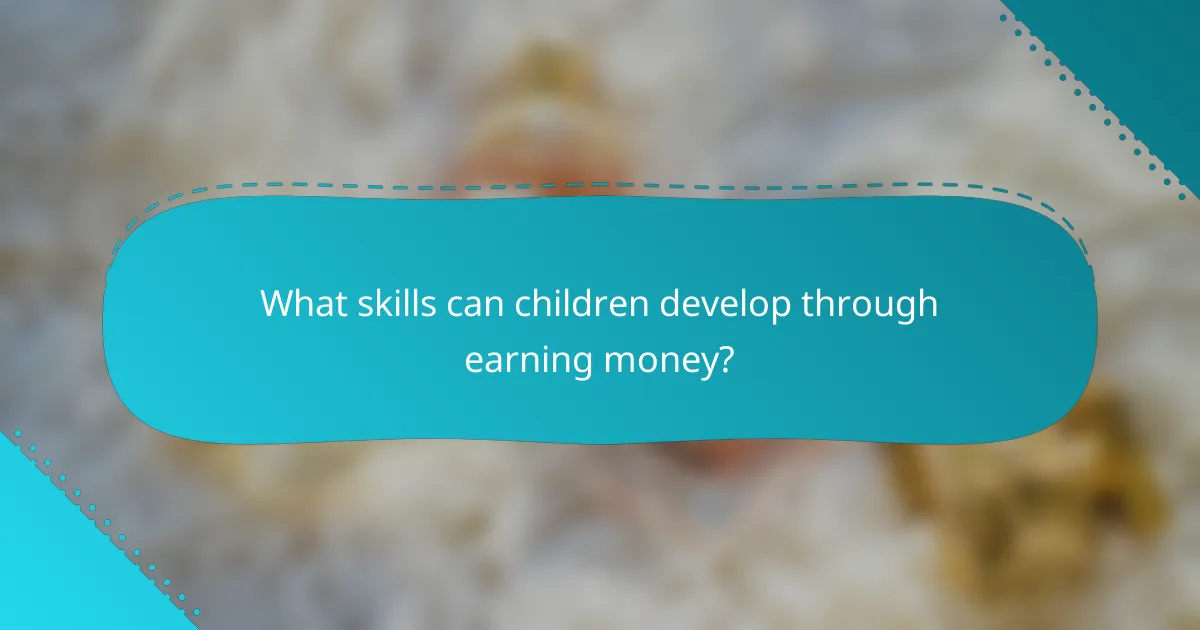
What skills can children develop through earning money?
Children can develop essential skills such as responsibility, money management, and communication through earning money. These experiences foster confidence and enhance problem-solving abilities. Engaging in activities like chores or small jobs helps children understand the value of hard work and the importance of financial literacy. As a result, they build a foundation for future financial independence and mental wellness.
Which entrepreneurial skills are most beneficial for young girls?
Entrepreneurial skills that benefit young girls include creativity, resilience, communication, and financial literacy. These skills enhance confidence, foster independence, and support mental wellness.
Creativity allows girls to generate innovative ideas and solutions in various activities. Resilience helps them navigate challenges and setbacks, building a strong mindset. Effective communication skills enable them to articulate thoughts clearly, essential for collaboration and networking. Financial literacy equips them with the knowledge to manage money wisely, a critical skill for future entrepreneurial endeavors.
Developing these skills early can lead to greater opportunities and success in adulthood. Encouraging participation in activities like workshops or clubs can further enhance these attributes.
How does budgeting teach financial literacy?
Budgeting teaches financial literacy by providing practical skills for managing money. It helps children understand income, expenses, and savings. By tracking spending, they learn to prioritize needs over wants. This process builds confidence and decision-making skills essential for financial independence. Engaging in budgeting fosters a sense of responsibility, preparing them for future financial challenges.
What communication skills are gained through customer interactions?
Customer interactions enhance communication skills such as active listening, empathy, and clarity. These skills boost confidence and foster mental wellness in children. Active listening ensures understanding, while empathy builds rapport and trust. Clarity in communication helps articulate thoughts effectively, essential for personal and professional relationships. Developing these skills through customer interactions prepares children for future challenges and opportunities.
How can teamwork contribute to skill-building in childhood jobs?
Teamwork significantly enhances skill-building in childhood jobs by fostering collaboration and communication. Children learn to share responsibilities, which builds leadership skills and encourages problem-solving. Engaging in teamwork also boosts confidence, as children receive support from peers. Furthermore, it nurtures social skills essential for future workplace environments. Ultimately, teamwork cultivates a sense of belonging and improves mental wellness, reinforcing the value of cooperative efforts in skill development.
What are examples of collaborative projects for young earners?
Collaborative projects for young earners include community gardening, school fundraising events, and local art exhibitions. These initiatives foster teamwork, enhance skills, and promote mental wellness. For example, community gardening teaches responsibility and environmental awareness while providing a sense of accomplishment. School fundraising events develop organizational skills and encourage social interaction. Local art exhibitions allow young artists to showcase their creativity and gain confidence in their abilities.

What unique opportunities exist for girls to earn money?
Girls can earn money through unique opportunities such as freelance work, tutoring, crafting, and online platforms. Engaging in these activities boosts confidence and builds essential skills. For example, girls can offer tutoring services in subjects they excel in, which not only provides income but also reinforces their knowledge. Additionally, creating and selling crafts online allows for creativity while generating revenue. These opportunities support mental wellness by fostering independence and self-esteem.
How can hobbies be transformed into income-generating activities?
Hobbies can be transformed into income-generating activities by leveraging skills, creativity, and market demand. Identify a hobby with potential, such as crafting, writing, or gaming. Develop your skills through practice and education. Create a portfolio to showcase your work. Utilize online platforms for marketing and sales, such as social media or e-commerce sites. Engage with communities related to your hobby to gain insights and build a network. This approach not only boosts confidence but also supports mental wellness through creative expression.
What crafts or services can girls offer locally?
Girls can offer various crafts and services locally to earn money, which helps build confidence and skills. Popular options include handmade jewelry, baked goods, pet sitting, tutoring, and crafting personalized gifts. These activities not only provide financial benefits but also enhance social interactions and mental wellness. Engaging in local services fosters a sense of community and responsibility.
What role do community programs play in supporting young female entrepreneurs?
Community programs play a vital role in supporting young female entrepreneurs by providing resources, mentorship, and networking opportunities. These initiatives foster confidence, enhance skills, and promote mental wellness among participants. Programs often include workshops that focus on business fundamentals, financial literacy, and personal development, which are essential for entrepreneurial success. By connecting young women with experienced mentors, these programs help them navigate challenges and build valuable relationships within the business community. Additionally, access to funding opportunities and community support networks can significantly impact their ability to launch and sustain businesses.

What rare attributes enhance the earning experience for children?
Rare attributes that enhance the earning experience for children include creativity, adaptability, and resilience. These traits foster innovative thinking, allowing children to explore diverse money-making opportunities. For example, creative problem-solving can lead to unique service offerings, while adaptability helps children navigate changing market demands. Resilience supports persistence in overcoming challenges, enhancing their overall earning potential.
How can mentorship influence young girls in their financial pursuits?
Mentorship significantly enhances young girls’ financial pursuits by providing guidance, fostering confidence, and building essential skills. Mentors share valuable experiences and strategies, which can lead to improved financial literacy and decision-making.
Research indicates that girls with mentors are more likely to pursue careers in finance and entrepreneurship, boosting their self-esteem and ambition. Additionally, mentorship helps develop a supportive network, encouraging resilience and mental wellness during their financial journeys.
In conclusion, mentorship is a powerful tool that empowers young girls to navigate their financial futures with confidence and skill.
What are the benefits of having a mentor in entrepreneurship?
Having a mentor in entrepreneurship provides invaluable support, guidance, and networking opportunities. Mentors enhance confidence, share industry insights, and help navigate challenges. They also offer accountability, fostering personal and professional growth. Studies show that mentees often experience increased success rates and improved decision-making skills.
What impact does cultural background have on earning opportunities?
Cultural background significantly influences earning opportunities by affecting access to resources, networks, and educational support. Children from diverse cultures may face unique challenges or advantages in skill development and confidence building. For instance, cultural emphasis on education can enhance skills, while socioeconomic factors may limit opportunities. Understanding these dynamics can help tailor support systems that foster mental wellness and skill acquisition in childhood.
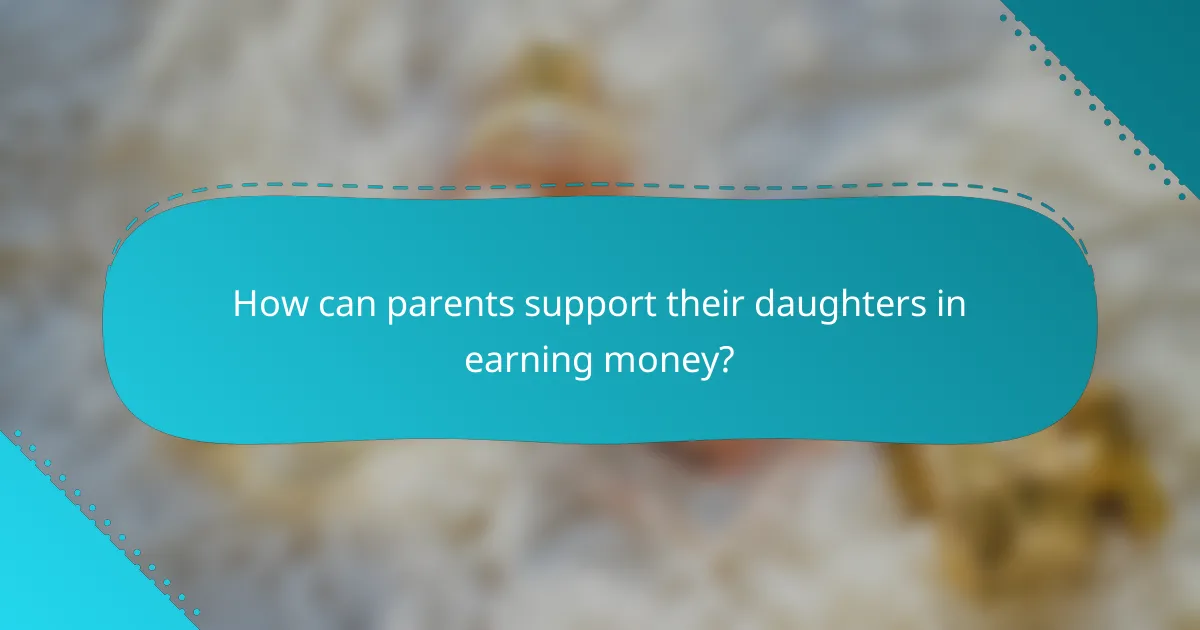
How can parents support their daughters in earning money?
Parents can support their daughters in earning money by encouraging entrepreneurship, fostering financial literacy, and promoting skill development. Open discussions about money management build confidence. Parents can introduce age-appropriate tasks like chores or small business ventures, enhancing responsibility. Providing resources for learning, such as books or workshops, equips daughters with essential skills. Celebrating achievements, regardless of size, reinforces a positive mindset towards earning.
What practical steps can parents take to encourage financial independence?
To encourage financial independence, parents can implement several practical steps. Start by teaching children the value of money through age-appropriate discussions about saving, spending, and earning. Encourage them to set financial goals, such as saving for a desired toy or experience, which fosters responsibility.
Introduce opportunities for children to earn money, such as chores or small jobs, which builds work ethic and confidence. Teach budgeting skills by involving them in family financial decisions, allowing them to understand the importance of managing resources.
Promote financial literacy through games or apps designed for children, making learning about money engaging. Lastly, model positive financial behaviors, demonstrating how to make informed spending choices and the importance of saving.
How should parents approach discussions about money with their children?
Parents should approach discussions about money with openness and encouragement. Start by fostering a safe environment where children feel comfortable asking questions. Use real-life examples to illustrate concepts like saving, spending, and earning. Involve them in family budgeting or savings goals to build practical skills. Encourage them to earn money through age-appropriate tasks, enhancing their confidence and responsibility. Discuss the importance of mental wellness by linking financial literacy to emotional well-being, helping children understand that managing money can reduce anxiety and promote stability.
What common mistakes should parents avoid when guiding their children?
Parents should avoid micromanaging their children’s choices. This can hinder their confidence and decision-making skills. Allowing children to explore their interests fosters independence. Neglecting to provide constructive feedback may lead to a lack of motivation. Focusing solely on financial outcomes can overshadow the importance of skill development and mental wellness. Encouraging a balanced approach ensures children learn valuable life skills while earning money.

What are the best practices for young girls to maintain mental wellness while earning money?
Young girls can maintain mental wellness while earning money by balancing work with self-care, setting realistic goals, and fostering supportive relationships. Prioritizing mental health is essential for building confidence and skills.
Encouraging hobbies that can generate income, such as crafting or tutoring, promotes creativity and responsibility. Establishing a routine that includes breaks and leisure activities helps manage stress. Engaging in open dialogues with trusted adults ensures emotional support.
Mindfulness practices, such as meditation or journaling, enhance emotional regulation. Setting achievable financial targets fosters a sense of accomplishment without overwhelming pressure. Lastly, celebrating small successes builds resilience and motivation.
How can stress management techniques be integrated into work-life balance?
Integrating stress management techniques into work-life balance enhances productivity and mental wellness. Techniques such as mindfulness, time management, and physical activity can be seamlessly woven into daily routines. For example, practicing mindfulness for a few minutes during breaks can reduce stress levels and improve focus. Setting clear boundaries between work and personal time allows for better mental separation, promoting relaxation. Engaging in physical activities, even short walks, can significantly alleviate stress and boost overall mood. Prioritizing these techniques fosters a healthier work-life balance, contributing to long-term mental wellness.
What resources are available for supporting mental health in young earners?
Various resources support mental health in young earners, including counseling services, peer support groups, and online platforms. These resources help build resilience and confidence. Schools often provide workshops focusing on mental wellness. Community organizations may offer mentorship programs that enhance skills while addressing mental health needs. Additionally, parents can access guides on fostering supportive environments at home.
What expert insights can help young women navigate financial challenges?
Young women can navigate financial challenges by gaining skills through early earning opportunities. Engaging in part-time jobs or entrepreneurial ventures builds confidence and fosters a sense of responsibility. Research shows that earning money in childhood positively impacts mental wellness, as it encourages independence and decision-making. Additionally, financial literacy programs tailored for young women can enhance their understanding of budgeting and investing, equipping them for future financial success.
